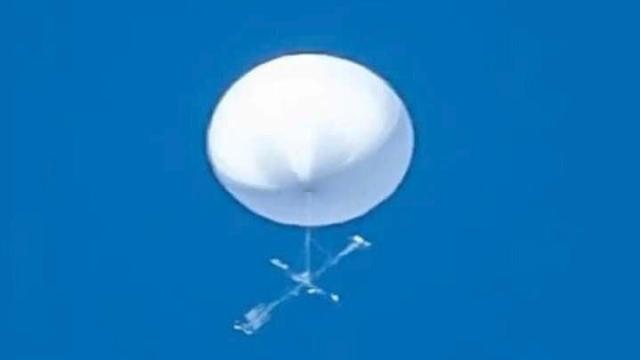The Chinese spy balloon captured images and video surveillance using American technology, U.S. officials reported on Thursday. The balloon, which was shot down off the coast of South Carolina earlier this year, likely didn’t transmit the information back to the Chinese government based on a preliminary investigation, although the investigation is still ongoing.
In February, the Chinese government denied the balloon was intended for surveillance, claiming instead that it was a weather balloon that had blown off course. But when the U.S. military retrieved the debris, it found technology suited to capture information from the ground including tools that are designed to gather and transmit data.
That technology has now been identified as commercially available in the U.S., with some of the technology readily available online, officials told the Wall Street Journal. The gear found in the debris supported the government’s belief that the balloon was intended to spy on the U.S. and contradicted China’s claims that it was used for weather monitoring.
The latest reports that the balloon did not transmit valuable information to China contradict an earlier piece by NBC in April which stated that sensitive military information was transmitted by the spy balloon overseas. The outlet cited two unnamed senior U.S. officials and one unnamed former senior administration official, who reportedly said the balloon passed over multiple military sites and sent real-time information back to Beijing despite the Biden Administration’s best efforts to prevent it.
At the time of its discovery, the U.S. military had moved potential targets to stop the balloon from picking up electronic signals, and Pentagon officials issued a statement in February, mere days before the balloon was shot down, saying it didn’t believe the balloon was able to capture sensitive information. “We assess that this balloon has limited additive value from an intelligence collection perspective,” officials said. “But we are taking steps, nevertheless, to protect against foreign intelligence collection of sensitive information.”
The new findings now seem to mirror the statement, as unnamed officials told the WSJ that Beijing had not obtained any information, but did not tell the outlet whether the balloon had malfunctioned or if the U.S. military’s quick reaction prevented it from collecting data. Beijing has warned that it will be forced to take extreme action if the U.S. government releases its findings or if the report becomes publicly available.
The findings come amid tense relations between China and the U.S., even as Secretary of State, Antony Blinken, travelled to Beijing earlier this month to attempt to repair the relationship between the two countries. Meanwhile, President Joe Biden has said the “chapter should be closed,” referencing the spy balloon, provided it doesn’t happen again, and called it “more embarrassing” for the Chinese government “than it was intentional.”
Even as officials provide new information on the spy balloon, yet another has appeared over Asia. According to BBC News, the balloon was spotted hovering over Japan this week, and it’s being closely monitored by the Japanese Ministry of Defence.
Yuko Murakami, from the Ministry of Defence, told the outlet that the Japanese government is “taking all precautions to monitor the situation on a daily basis,” and will consider shooting down the balloons if it means protecting the “lives and property of people in the territory of Japan.”
